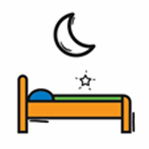Sleep and the lack of it is a big topic for many parents. When your child has an additional need the likelihood of ongoing sleep problems is higher.
Some research says that about 80% of children and young people with additional needs have sleep issues.
You are not alone and there is support and information available that can help you.
Taking care of yourself in whatever way you can is important. If you have a partner plan ahead to share the broken nights. Try and make sure you are both getting the occasional longer stretch of sleep.
 Are there family and friends who could help out sometimes?
Are there family and friends who could help out sometimes?Talk to your GP and professionals involved in your child’s care. They can help assess your child’s sleep challenges and support you too. There may be more help available for you and your family.
Not getting enough sleep has big effects on the whole family. It affects physical and mental health. When you and your child are sleep deprived everything can feel harder.
The advice that is given to all families to help with sleep problems is a good place to start.
Bedtime Routines
If your child does not settle – go to them and reassure them that you are nearby and leave the room as soon as they are calm again. You might have to repeat this many times but will build their confidence that you are there when they need you.
Keep to it even if you don’t think it is making a difference – routines take time.
Supporting Bedtime Routines
You may have tried all the usual advice with no success.
If disturbed sleep has been a problem for a long time it is likely to be having a negative affect on you. If you are still struggling ask the any of the team working with your family for more help or support. You can also contact Just One Number for advice.
This online course is for parents with a child with additional needs. It is for parents, relatives and friends of children who may have a physical or learning disability or who may have autistic traits. This short course will help you learn about:
Sign up for FREE with access code: JON70
If your child is 12 months or older, you can contact the National Sleep Helpline on 03303 530541 for support and advice. This is available Sunday - Thursday 7pm - 9pm. The helpline is run by a team of specialist trained sleep advisors. Although they cannot give medical advice, they can talk through your issues, offer you some practical strategies and recommend services that could help.
You can contact the Healthy Child Programme by calling Just One Number on 0300 300 0123 or texting Parentline on 07520 631590. Our opening hours are 8am-6pm Monday-Friday (excluding bank holidays) and 9am-1pm on Saturdays.
If your child attends school or an early years setting, talk to them about any concerns you may have, they can reassure you and / or help you find the right help.
Early Childhood and Family Service supports all Norfolk families with children under 5 years.
To speak to other Norfolk parents and carers, you can join our online community forum below.